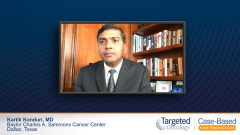
The Future of Treating Small Cell Lung Cancer
Kartik Konduri, MD, comments on the future of treating extensive-stage small cell lung cancer and provides advice for community oncologists treating patients with the disease.
Kartik Konduri, MD: In the last few years, we have been able to improve outcomes for extensive-stage small cell lung cancer for patients by using new therapies, such as immunotherapy, which we have not been able to do over the last 15 to 20 years. This is certainly a promising outcome, and we need to build upon it. There are new medicines that are being combined with immunotherapy and other investigational drugs such as PARP inhibitors, bispecific antibodies, antibody drug conjugates, which are on clinical trials.
My advice to my colleagues practicing community-based oncology is to be aware that newer medicines are now available for standard first- and second-line therapies for extensive-stage small cell lung cancer. This is a very aggressive disease, and any improvements that we can provide to our patients are deeply appreciated.
Clinical trials using new therapies, such as PARP inhibitors, bispecific antibodies, as well as antibody drug conjugates are being evaluated. And the use of immuno-oncology in the limited-stage small cell lung cancer stage of disease is also being assessed. Therefore, if we can look forward [to] these trials and encourage participation of our patients, we hope to help improve outcomes for our patients in this very aggressive disease.
COVID-19 [coronavirus disease 2019] has certainly proposed challenges for helping take care of our patients in this day and age. However, many of our clinics and practices have learned how to deal with it and encouraged safety protocols that were put in place so that we have an ability to help take care of our patients’ safety and efficaciously. Telemedicine is something that we are using at this point of time to try to monitor our patients in between treatments so that we can assess for toxicities and side effects hopefully in the near future.
Transcript edited for clarity.
Case: A 68-Year-Old Woman with Extensive-Stage Small-Cell Lung Cancer
Initial Presentation
- A 68-year-old woman presented with fatigue and a cough
- PMH/PSH: hysterectomy at age 55
- SH: 55-pack year smoking history
- PE: decreased breath sounds in the left lung, cervical lymph node enlargement
Clinical Workup
- Labs: WNL
- Lymph node biopsy showed small cell carcinoma
- Chest/abdomen/pelvic CT showed a 7.4 cm mass above the diaphragm, a small contralateral lung nodule and evidence of invasion into the left side of the pericardium
- PET scan showed activity in both lungs, above the diaphragm with small hypermetabolic activity in the surrounding area
- Contrast‐enhanced MRI of the head was negative for brain metastases
- Stage IV extensive-stage small-cell lung cancer; ECOG PS 0
Treatment
- Initiated carboplatin + etoposide + atezolizumab for 4 cycles; followed with atezolizumab as maintenance therapy
- Repeat CT scan showed a suspicious hepatic mass
- Initiated lurbinectedin 3.2 mg/m2 IV q21 Days






































